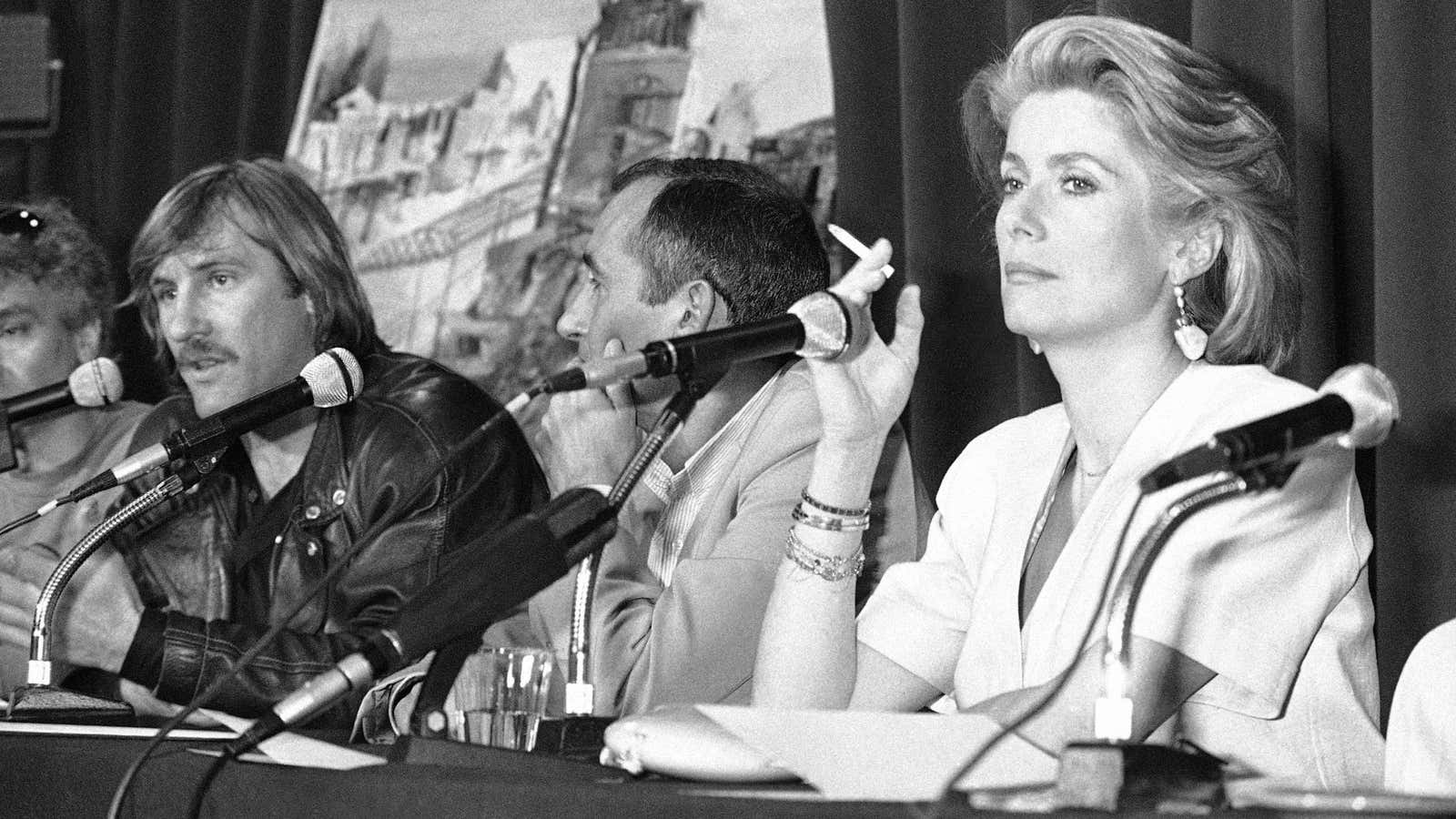Earlier this week, 100 prominent French women—including actress Catherine Deneuve—signed an opinion piece in Le Monde denouncing the American #MeToo movement. As noted by Lauren Collins at the New Yorker, the piece is “a series of tired arguments” with rape apologies and assertions that women have been rendered “eternal victims” from the movement.
Collins also points out that most of the 100 signers were white, wealthy women in professional and creative classes—like lawyers, doctors, journalists, and curators. “There aren’t any housekeepers or bus drivers on the list, and there is no acknowledgment that things might be more complicated when a woman is not the leader of her professional team, as women so often are not,” she noted. These women do not speak for all French women—but they generally espouse the now-cliché notion of French women being slim, stylish and “effortlessly chic.” They are what we think French women are, and they’ve capitalized on this feminine mystique.
France actually has a sizable viral #MeToo movement of its own—it’s called #BalanceTonPorc, which means “denounce your pig.” It has a more vengeful connotation: it invites French women to share names. “The French may still consider Americans too moralistic when it comes to sex, but when it comes to sexual harassment, it took an American scandal—and good old-fashioned investigative reporting—to open a debate France has needed to have for some time,” Rachel Donadio wrote at the Atlantic.
The junior minister for gender equality, Marlène Sciappa, is also considering issuing fines for cat calling. (If you’ve ever stepped foot in France, you probably know how prevalent cat calling is, and how it’s seen as a rite of passage for young women studying abroad in Paris). Not bad for a country that continues to honor convicted child rapist Roman Polanski.
The failure to empathize or even conceive that there are women whose circumstances or dispositions or beliefs are different from their own is, well, very French in some way. French women and French culture are placed on pedestals in American culture. There are countless books and glossy magazine articles about how to eat, parent, dress, put on makeup, and have sex like a French woman. Never mind that French women are thinner because they smoke more cigarettes and have pharmacies with entire rooms dedicated to diet treatments (looking at you, Citypharma du Four Bonaparte) and that French women are expected to put up with their partners’ infidelities because they are, as we Anglo-American women put it, “cool girls” who aren’t “like the other girls.”
There are examples of such “coolness”. There’s Catherine Deneuve, Brigitte Bardot, or Gabrielle “Coco” Chanel. Never mind that Deneuve just signed the petition against #MeToo, Bardot is a known racist, and Chanel was a Nazi spy and anti-Semite. Paris isn’t just a city of wide boulevards and baguettes, either—it is a city that pushes its poorest residents, especially those who are non-white and especially those who are Muslim, to the outskirts in suburbs called banlieues. In 2004, France banned the headscarf, citing that religious head covers oppose their official motto and set of values, “Liberté, égalité, fraternité,” or “liberty, equality, and fraternity.” France values equality in the sense that everyone behaves the same way—not equality in the sense that people can, necessarily, assert their individualities.
French culture is determined to fight the encroaching Anglo-Americanization of popular culture, which one can witness easily from the ban of Americanisms by the Académie Française, which governs the French language. But, nonetheless, the French are copying the Americans these days: French eyewear brand Jimmy Fairly is directly based on American eyewear brand Warby Parker and its “buy one, give one” philanthropy model, and the décor of Paris-based women’s co-working space Mona looks a lot like New York City-based women’s co-working space The Wing. And to seal the deal, Paris is obsessed with Brooklyn. (Or an ideal of Brooklyn.)
Perhaps French women should be more like American women, you may conclude. But the backlash against #MeToo is happening stateside, as well: six days ago, acclaimed American writer Daphne Merkin wrote an opinion piece in the New York Times that accused the #MeToo movement of turning young women in “Victorian housewives.” Like many of her Parisian anti-#MeToo counterparts, Merkin is wealthy, white, and highly influential. In her book, The Fame Lunches, she described her post-college apartment as less than ideal because it was in the “less genteel” part of the Upper East Side. (No doorman?)
Still, the #BalanceTonPorc was actually started at the same time as #MeToo by Sandra Muller, a French journalist based in New York City. Although American women may have spent the past few decades envying their Parisian sisters, Muller’s movement suggests that the French are just as influenced by their American peers. It may be time that women on this side of the Atlantic finally give up the fantasy of the French female ideal.
